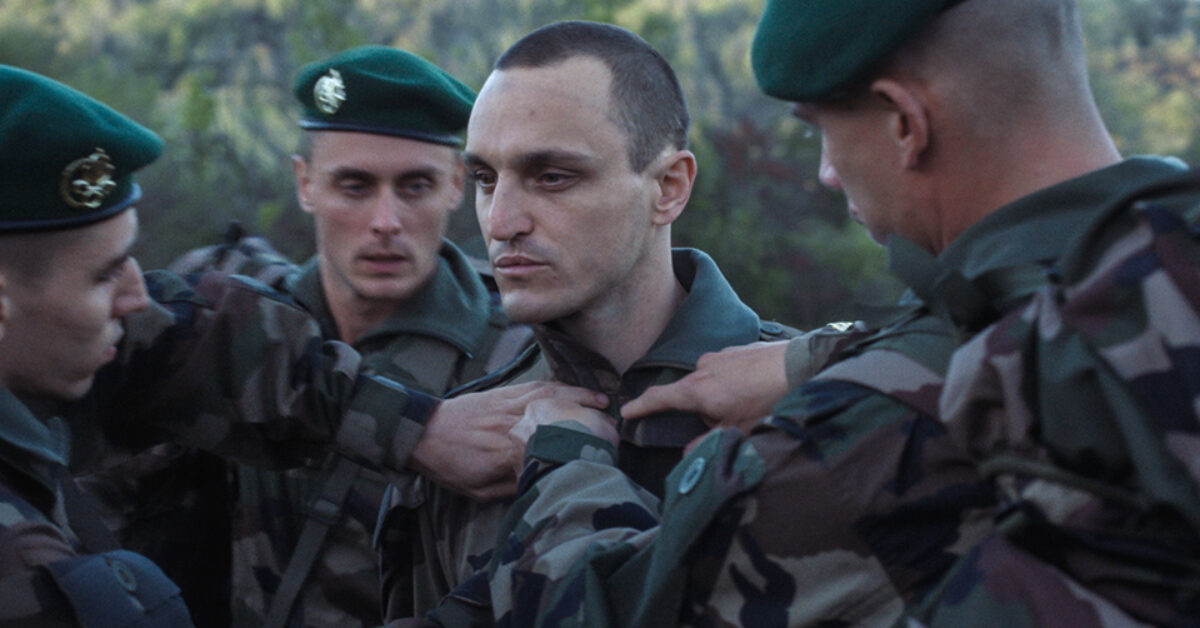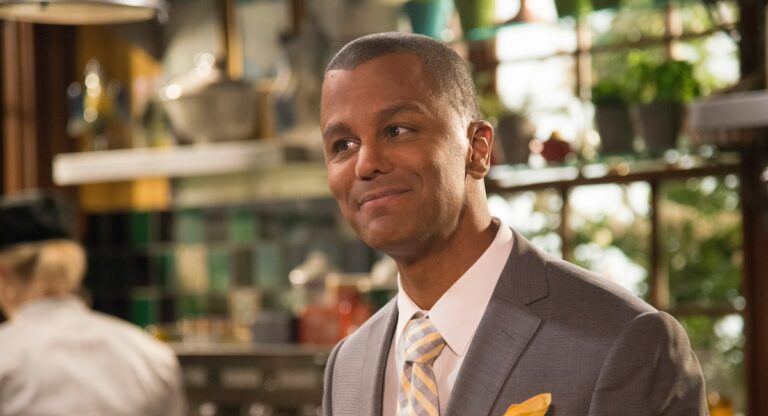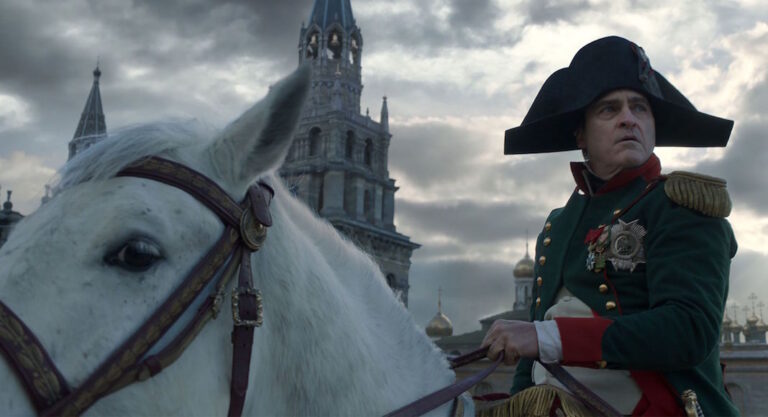When we meet Aleksei (Franz Rogowski), the protagonist of Italian director, Giacomo Abbruzzese’s, bold debut feature, Disco Boy, he is elated. Aleksei and his friend Mikhail (Michał Balicki) are on a noisy bus headed from their home in Belarus to a soccer match in Poland. They’re taking a long, treacherous journey to sneak into France, where they intend to gorge themselves on Camembert, pain au chocolat, and bottles of Bordeaux for the rest of their lives. They’re even fired up about La Vache Qui Rit. But things go awry, and Aleksei lands in Paris alone, a broken man. With few options available to illegal immigrants, he joins the French Foreign Legion, trading five years of service for a French name and passport.
In Nigeria, a world away from Paris, we encounter Jomo (Morr Ndiaye), a guerilla fighter leading a struggle to defend his community against the oil companies that are raping the land of its resources. His sister Udoka (Laëtitia Ky) believes it’s too late to fight and dreams of fleeing their doomed village. By the time Aleksei and Jomo’s worlds collide—after Jomo’s group kidnaps several French nationals and Aleksei’s team is sent to extract them—we’ve spent time with both men and hold our breath, aware that only one side can win a war.
Abbruzzese set out to make a new kind of war film, one that embraces both Aleksei’s and Jomo’s points of view. (The film was shot in Île de France, Reunion Island, and Poland, with dialogue in French, English, Igbo, and Polish.) At the center of the action is the magnetic German actor and dancer Rogowski, who recently made people love him or want to punch him (or both) in Passages. Here he is haunted and vulnerable, a man with an opportunity to become a new person, yet unsure if this is the person he wants to become. Equally impressive are charismatic newcomer Morr Ndiaye, and Ivorian artist and activist Laëtitia Ky. Thanks in large part to eye-popping visuals from esteemed French cinematographer Hélène Louvard (The Lost Daughter), the film won the Silver Bear for Outstanding Artistic Achievement at the Berlin International Film Festival. With those divine images thrown jarringly against the propulsive sounds of French electronic musician Vitalic, tension mounts as reality gives way to increasingly dreamlike images, blurring the line between reality and what might be memory or hallucination. Yet we remain invested, hoping for transcendence, even as we wonder what that could possibly mean in a world as screwed up as this one.
I spoke with director Giacomo Abbruzzese about the power of ambiguity, what he likes about living and making movies in France, and his great luck in landing rising star Rogowski “before he becomes too expensive.”
Q&A with Director Giacomo Abbruzzese
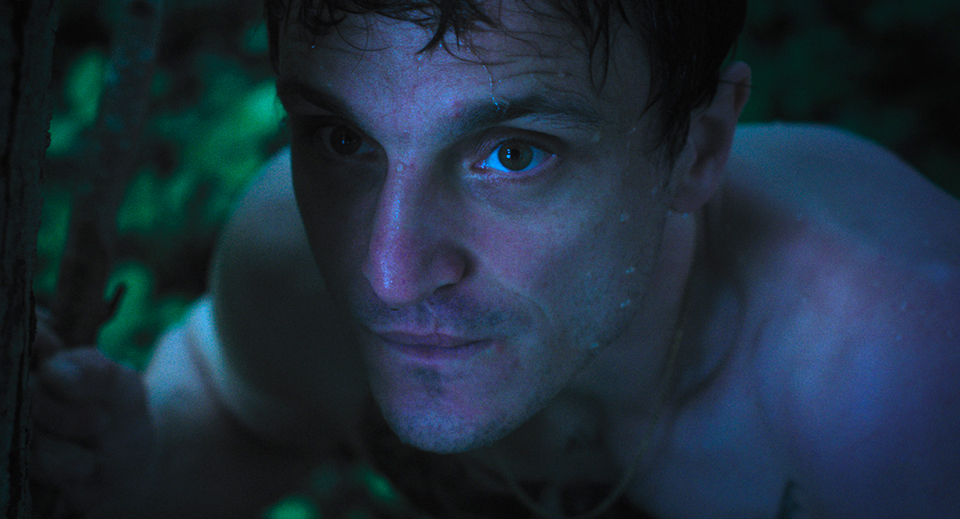
What was the original seed of an idea for this film?
The character Aleksei came from a person I met in a discotheque in the south of Italy, where I’m from, who was a dancer before he became a soldier. I was interested in how the same person could embody two very different definitions of the human body. I realized those two universes had some contact points, like a sense of choreography, discipline, and being physically destroyed at the end of the day.
That isn’t what I expected you to say, but it’s a beautiful idea.
Also, I was invited to Kiev to show one of my short films, Fireworks, about a group of eco terrorists. There were some guys from Belarus at the screening. They were totally in love with my film and invited me to Minsk to participate in this underground film festival. I met young people there, whose friends joined the French foreign legion to get a passport and never came back. Some of those people fantasized about doing the same thing, and I realized they were not so different from me. The main difference was that I had the privilege to have an Italian passport and they had a Belarusian one. They weren’t fanatics who wanted to go to war. They were hoping to have a better life.
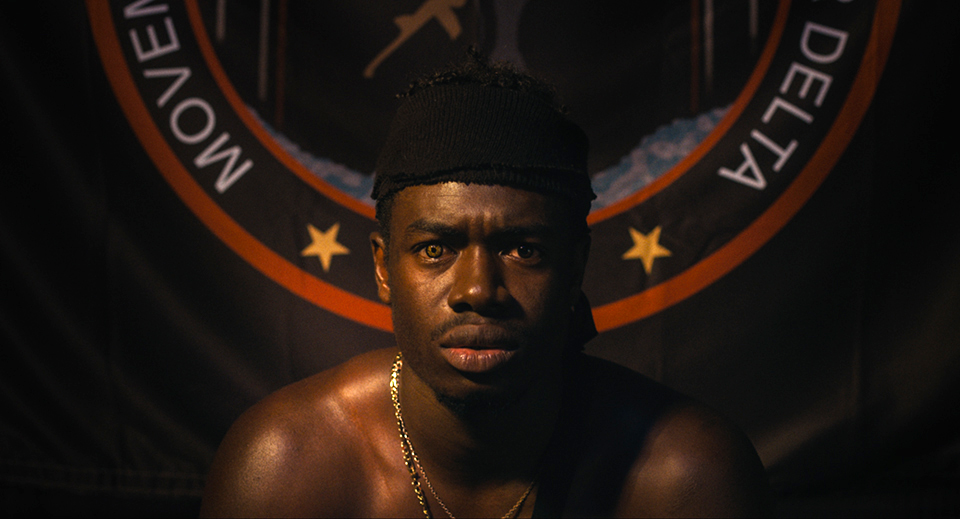
What about Jomo?
At that time, I was also reading about MEND (Movement for the Emancipation of the Niger Delta), the first environmentalist group to enter into an armed struggle. They have a sense of spectacle, the way they dress up, the way they talk on TV. All this became the idea of making a totally different kind of war movie. In the war movies I saw, the other—the victim or enemy—never exists for more than 30 seconds. We never really know his story. I wanted to follow the story so that when Aleksei and Jomo fight each other, the spectator is not standing emotionally for one or the other. We’re watching the horror that is to kill somebody you don’t know anything about.
We don’t know Aleksei’s back story, but we sense that he’s running from something. In a way we learn more about Jomo’s inner life because we see his village and meet his family.
Franz Rogowski is fully aware of his body. I could work with him sculpturally, talking about which way his character is gonna walk, which way he’s gonna sit, which way he’s gonna drink and how this tells us something about the way he thinks, instead of verbalizing or explaining everything, for example, oh, he left because he was a criminal or because he was gay or whatever. I didn’t want to enter a category for him. Jomo was different. The media often goes with an idea of what they need for a story. It’s not that what they’re producing is fake, it’s just missing the counter shot and often the counter shot tells us a lot. So we get someone with a headcover and weapons talking to the camera, and you have zero empathy with these people. They just look like crazy, dangerous guys, but the reality is more complex than the one single image we get.
Your script is so lean. There’s no exposition. Then there are surreal, mesmerizing moments when we’re not sure if we’re seeing memories, hallucinations, dreams or fantasies. What effect did you imagine these plunges into a different reality would have on the viewer?
The film starts in a very exterior way with a character crossing borders, landscapes, characters, different languages. We go through the exteriority in the first part of the film and the second part in Africa. In the third part, the movie implodes. It becomes mental. We are with Aleksei and I didn’t want a feeling that he’s having post-traumatic stress disorder and that’s why he’s having these hallucinations. I want to be on the thin line where it could be that or it could be something magic. There’s a lot of movies about traumatized soldiers and it was important for me to have a little doubt. Is he seeing all this? Can others see it or just him? I don’t like when films look the same from the beginning to the end. I like when a movie is moving and changing, especially this film, which is about metamorphosis. At some point it’s like the film decided to open all the windows and doors and let things circulate and let the invisible enter. This film could be a collective dream with Aleksei crossing into the dreams of Jomo. There’s so much we don’t know about how our minds work.
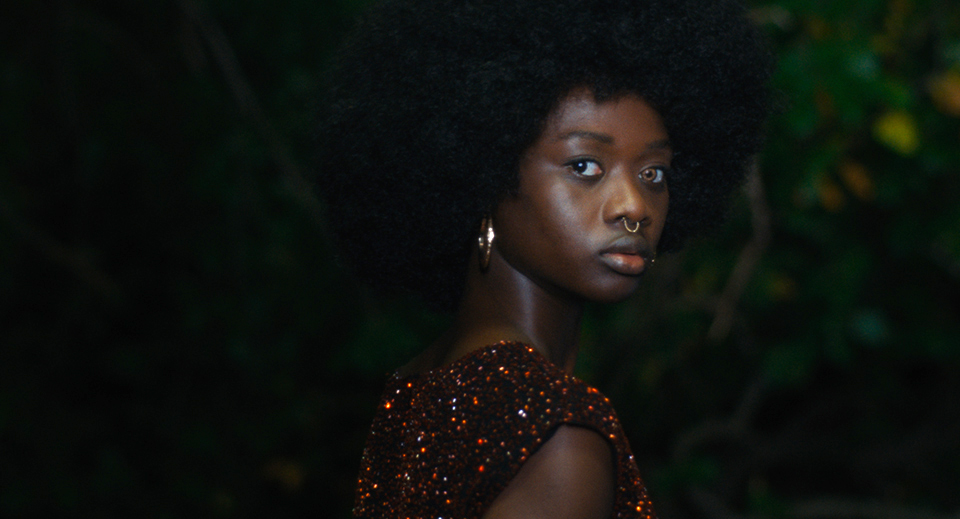
Have you gotten any pushback for these scenes where you don’t really know what’s happening? People don’t always like ambiguity.
You have people who need everything to be clear. I’m not that kind of person. I need the unknown. I put myself in uncomfortable positions. It’s something I need to create. The worst for me during writing and financing was the moment where people who have never made a movie came to tell me, you should do this, because everybody is doing this. You should for example cross the two stories from the beginning so it’s more clear, but for me this is TV series language. I like to have an adult relationship with the viewer, not a Pavlovian relationship: now he has to feel this and this and this. I like when a film puts me in the position of the character. I don’t know more than him. We don’t know where the film will bring us. Sometimes when I watch movies, I have the impression I know everything that is going to happen, how it’s gonna end, and it’s a pity. There are films that people really love and others don’t like at all. I knew that probably Disco Boy would be in the same category, but I was not sure there would be people who really love it. We are very happy that there are, considering it’s my first feature and it won an award at the Berlinale. When people watch the film, they go through a kind of sensory voyage. Not everybody can put into words what they felt, but it has a huge impact.
You are Italian but you live and make movies in France. What do you love about France and French filmmaking?
France is the Hollywood of arthouse film. Paris is a very international city, and you have all that’s important for me: art, cinema. Even if I don’t necessarily love Parisians all the time, I like the opportunity and the quality of life that Paris can give you. I would not be able to have the same career in Italy. I’ve lived off my work for 12-13 years, even when I was doing short films and documentaries, and in France that’s possible. That doesn’t mean it’s easy; it’s hard, there’s a lot of competition, but there are more funds, grants. The system considers art something precious and the daily life of artists is fragile, so they invent ways to make it possible.
That makes me want to move back to Paris! You shot with the amazing French cinematographer Hélène Louvart. She shot The Beaches of Agnès, Pina, Never Rarely Sometimes Always, some of my favorite movies. What did she bring to the film?
I think she’s one of the top ten DOPs (director of photography) in the world, and also I think she’s somebody who really tries to understand which kind of film you want to do and helps you as much as she can, with her experience, her skills. She has this amazing way of keeping the light moving, looking very alive. She’s also a beautiful human being, an extremely hard worker, I never saw someone working hard like Hélène, and to always have such a good mood. The shooting was extremely hard, absolutely the hardest of my life. We did this film in only 32 days.
In three countries!
Yes! We shot with the quickness of a soap opera, but it’s not a soap opera. I lost 7 kilos that I gained back in editing. It was really, really intense.
The combination of arresting images and the bold, immersive music of Vitalic builds a world that’s at once dreamlike and troubling. The tension that builds throughout the film is as much about sound and vision as it is about the story.
In general I prefer to communicate in a sensory way more than a verbal way. Cinema can show so much instead of saying. I’m interested in the kind of poetry that happens when you put things in contact that weren’t in contact before and this new link creates feelings and emotions, like doing a war film with the techno music of Vitalic and the light of Hélène. It was really something to play with contrasts which no one would imagine together. The strange mix makes this object that you can’t easily categorize, and I’m very happy about this.

What does the film say about male stereotypes?
When I was editing, some people had problems with the dialogue in the car with the girls and the legionnaires. People were saying after #MeToo, we can’t have dialogue like this, but it’s bullshit, if you know how legionnaires talk. You use pieces of reality and combine them to create meaning. It’s part of the universe we’re moving through. On another level, you have the relationship between Aleksei and Mikhail. It’s not totally clear if it’s friendship, if it’s love. It’s quite open. I didn’t want to say this is a gay couple escaping from Belarus. For me it would be boring. I’m already bored when I say this. All the soldiers I met had this mystery. You feel that something broke inside of them. I spent a lot of time in time in Malousque, a beach near Marseilles where a lot of legionnaires go. I remember sometimes there was this amazing body coming out of the sea and it was missing a part of a leg or something. I found all this fragility behind this imposing strength.
The foreign legion was the perfect device for you. It sets up such a strong conflict for Aleksei. He has a hard time being a soldier, but he needs the French passport. He starts out as this person going to France to eat crème caramel, but transforms into someone else, someone who’s haunted, someone with a conscience.
I was very astonished that in the history of French cinema, you don’t have so many movies about the foreign legion, considering its importance in the French army. They go into the most dangerous places for France. It’s like the Marines in the US, and imagine how many movies have been made about the Marines. I think there are maybe five or six films about the foreign legion, but not even one of these films was about what was the most important thing to me: the impact of giving five years of your life to get a French passport.
They’re five very dangerous years. It’s a unique opportunity, but they’re preying on these men, because they all need that passport.
There’s maybe 5% of people who go to the foreign legion because they broke up with their girlfriend or something. That’s a bad choice, but generally people join to get papers. Before it was also connected to crimes, you know, communist terrorists or fascist terrorists. They’d escape to France and enter the foreign legion. It was the only way to have a clean start, a new birth.
Who are your cinematic influences?
Antonioni, Pasolini, Fellini for Italy; Godard for France; Herzog, Fassbinder for Germany; Kubrick for the Anglo-Saxon world. Scorsese is a very important director for me, and Tsai Ming-Liang, a director from Taiwan I watched when I was 18, 19. He made really very poetic, very silent, very true images.
You must know that people are comparing the film to Beau Travail by Claire Denis.
I didn’t see Beau Travail before I wrote the film. When I was trying to raise money for the film, a lot of producers were saying it was an homage to Beau Travail and I said, honestly I never saw it. I saw Trouble Everyday, which is a film I loved, but I didn’t see all the films of Claire Denis. So, I was wondering, do I watch it before shooting or not? I was a bit afraid to watch it and then I think three months before shooting, I saw it and I was so impressed. It’s like we had the same projection. We see dancing in the bodies of the soldiers, but for me it came from a personal event, from a real existing person who was a dancer before he became a soldier, so I was really touched by how people from different times and space can have a similar feeling, like when we were drawing in the caves. They could not have communicated, but they were doing the same drawings everywhere, so there’s some stuff that’s in the air.
What’s next for you?
My next film is set in Milano in the 90s. Disco Boy was my political film about France, my next one is my political film about Italy.
How do you want the viewer to feel at the end of this film? What do you want us to walk away with?
With something they will think about for days, weeks. That is the most beautiful thing for me, when a film is still working inside of you, that it is not ended with the screening, but you go back to the film and even some people say, I needed to see it another time. This is my hope, and I’m glad some people couldn’t talk immediately about the film. This is also important: you can’t say in one sentence what the film is about. It’s the opposite of what Hitchcock said: if the viewer cannot say in one sentence what they’ve just watched, it’s a problem. I don’t totally agree with this. I think sometimes you are speechless in front of something that really troubled you and you need to process. We’re in a time when we’re so into quick feedback, but sometimes you need time to understand and think, it’s important to take some time and some distance. This is what I hope for the viewer, that the film can go with them and be with them and join in their dreams sometimes.
Disco Boy opens February 2 in New York, and February 9 in LA, followed by a national rollout.
Andrea Meyer has written creative treatments for commercial directors, a sex & the movies column for IFC, and a horror screenplay for MGM. Her first novel, Room for Love (St. Martin’s Press) is a romantic comedy based on an article she wrote for the New York Post, for which she pretended to look for a roommate as a ploy to meet men. A long-time film and entertainment journalist and former indieWIRE editor, Andrea has interviewed more actors and directors than she can remember. Her articles and essays have appeared in such publications as Elle, Glamour, Variety, Time Out NY, and the Boston Globe.

